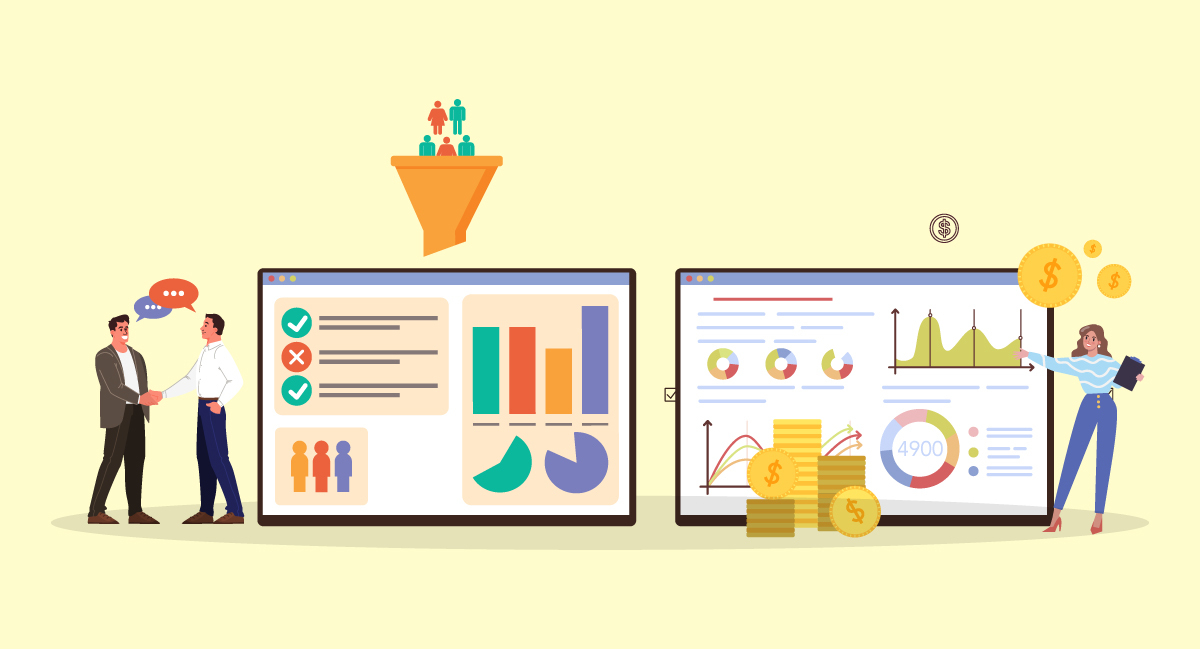Tech solutions like ERP and CRM systems have become essential tools for enhancing operational efficiency and customer experience and driving growth. ERP focuses on streamlining internal processes and managing resources, while CRM is dedicated to strengthening customer interactions and improving overall satisfaction.
The global ERP software market is valued at $59.48 billion in 2023 and is expected to reach $123.41 billion by 2030 On the other hand, the CRM software market is valued at $79.40 billion in 2023 and is forecast to grow to $131.90 billion by 2028.
But what are ERP and CRM, and what is the difference between ERP and CRM? Also, why are they important for your company? Let’s understand it in detail.
What Is ERP vs. CRM?
ERP, an acronym for Enterprise Resource Planning, is a comprehensive software system that integrates and manages core business processes, including finance, human resources, procurement, inventory management, and manufacturing. It serves as a centralized hub, enabling efficient data management, collaboration, and automation across different organizational departments.
Pro-tip
When considering ERP vs. CRM for your business, it’s crucial to prioritize your specific needs and goals. Rather than focusing solely on each system’s features, identify your organization’s key pain points and strategic objectives. Choose the system that aligns best with those priorities, considering factors such as scalability, integration capabilities, and long-term business growth.
On the other hand, CRM stands for Customer Relationship Management. It is a software solution that manages and nurtures customer relationships throughout the entire customer lifecycle. CRM systems store and analyze customer data, such as contact details, interactions, past purchases, and preferences. They equip sales, marketing, and customer service teams with tools to enhance customer engagement, drive sales, and deliver personalized experiences.
What Is the Difference Between an ERP and a CRM?
There are several differences between ERP and CRM systems in terms of scope, functionality, data focus, and business impact. Let’s understand the key differences between CRM vs. ERP in detail.
1. Scope and Focus
An ERP system encompasses many core business processes, including finance, human resources, procurement, inventory management, and manufacturing. It focuses on integrating and managing internal operations and resources.
In contrast, a CRM system is specifically tailored to managing customer relationships throughout the entire customer lifecycle. It captures and analyzes customer data, interactions, and preferences.
2. Functionality
ERP systems offer functionalities related to resource planning, supply chain management, financial management, manufacturing processes, and other internal operations. They provide inventory control, order management, accounting, and production planning tools.
However, CRM systems focus on lead management, sales & marketing automation, and customer experience. They empower businesses to manage customer interaction history, leads in different stages, and offer personalized messages.
3. Data Management
An ERP system primarily focuses on internal data, such as employee information, inventory levels, financial transactions, and production schedules. It facilitates data integration and provides a comprehensive view of internal processes.
On the other hand, a CRM system emphasizes customer data, including contact details, communication history, purchase patterns, and customer preferences. As a result, you can build rapport with customers, personalize your messaging, and increase lifetime value.
4. Business Impact
The impact of an ERP system is felt across the entire organization, streamlining processes, improving efficiency, and enabling better resource utilization. This results in operational effectiveness, cost management, and decision-making.
On the other hand, a CRM system directly impacts customer-facing activities, empowering businesses to deliver personalized experiences, improve sales effectiveness, and build stronger customer relationships.
Key Similarities Between ERP and CRM Software
While there are several differences between ERP and CRM systems, they also have various similarities. For instance, both facilitate collaboration and communication, integrate with third-party tools, generate valuable insights, and are customizable. Let’s look at ERP CRM similarities.
1. Data Management
Both ERP and CRM systems offer robust data management functionalities. They provide a centralized database to store and organize relevant information. Whether it’s internal data related to finances, resources, or customer data like contact information, interactions, and preferences, both systems enable businesses to manage and access critical data effectively.
2. Integration Capabilities
CRM and ERP integration allows organizations to connect them with other software applications and systems. This allows for seamless data exchange and communication between organizational departments and processes. Integration also ensures that information flows smoothly across various functions, enhancing efficiency and reducing duplicate data entry.
3. Reporting and Analytics
Both ERP and CRM systems provide reporting and analytics functionalities. These features enable businesses to generate valuable insights from the data they collect. By leveraging reporting tools, organizations can gain visibility into key performance indicators, identify trends, make data-driven decisions, and measure the effectiveness of their operations or customer engagement efforts.
4. Collaboration and Communication
Both ERP and CRM systems foster collaboration and communication within an organization. Whether coordinating internal processes in an ERP system or facilitating customer interactions in a CRM system, both solutions aim to enhance teamwork and ensure effective communication across departments.
5. Scalability and Customization
ERP and CRM solutions can be customized and scaled to meet an organization’s needs. As businesses grow and evolve, these systems can adapt to changing requirements, allowing for expansion and accommodating new processes or functionalities. Customization options enable organizations to tailor the tool to their unique workflows and preferences.
ERP vs. CRM: What Are Benefits?
ERP vs. CRM is a tough battle, especially when you consider the benefits both have to offer. Let’s look at how CRM versus ERP stands in terms of benefits.
Benefits of ERP
An ERP system helps streamline operations, improve resource management, enhance decision-making, and ensure compliance. Here are the key benefits of ERP for your business.
- Streamlined Operations: ERP systems integrate core business processes, eliminating redundant tasks, data silos, and manual errors. This streamlines operations, improves efficiency, and enhances productivity across departments.
- Improved Resource Management: ERP systems provide real-time visibility into inventory levels, production schedules, and resource utilization. This allows businesses to optimize resource allocation, minimize waste, and make informed decisions to improve profitability.
- Enhanced Decision-Making: With access to accurate and up-to-date data, ERP systems enable better decision-making at all levels of the organization. They offer reporting and analytics tools that generate insights, enabling businesses to identify trends, spot opportunities, and address challenges proactively.
- Increased Collaboration: ERP systems promote department collaboration and communication by centralizing data and workflows. This fosters cross-functional teamwork, facilitates information sharing, and enhances overall coordination within the organization.
- Compliance and Risk Management: ERP systems often include features to ensure compliance with regulations and industry standards. They help businesses adhere to financial reporting requirements, maintain data security, and manage operations and supply chain risks.
Benefits of CRM
CRM software comes with its own benefits, including better customer relationships, personalized marketing campaigns, and improved customer retention. Let’s look at CRM benefits in detail.
- Enhanced Customer Relationships: CRM systems allow businesses to understand their customers better by centralizing customer data and interactions. As a result, you can improve customer engagement, offer personalized experiences, and build stronger relationships.
- Sales and Marketing Efficiency: CRM systems streamline sales processes, automate workflows, and provide lead management and opportunity tracking tools. They empower sales teams to manage pipelines effectively, close deals faster, and improve sales performance. CRM systems also support targeted marketing campaigns by segmenting customer data and enabling personalized messaging.
- Customer Service Excellence: CRM tools facilitate efficient customer service management by providing a 360-degree view of customer interactions, inquiries, and support tickets. This enables timely and personalized responses, improving customer satisfaction and loyalty.
- Data-Driven Insights: CRM platforms offer reporting and analytics capabilities, allowing businesses to gain valuable understandings of customer behaviors, preferences, and buying patterns. These insights drive strategic decision-making, product/service improvements, and effective marketing strategies.
- Customer Retention and Upselling: CRM software helps companies understand the customers’ needs and identifies the risk of churn so you can take proactive steps to prevent the customer from leaving. It also helps determine which customers are more likely to upgrade their product, enabling you to upsell to them.
Comparisons of Key Features Between ERP and CRM
When analyzing ERP vs. CRM systems, it is critical to understand the features offered by both systems.
ERP software helps businesses manage their operations. It has features to assist with accounting, order management, supply chain management, tracking inventory costs, and more. Some ERP solutions also have integrated customer relationship management capabilities.
On the other hand, CRM software helps track customer information, run marketing campaigns, track sales, and offer self-service options (chatbots, knowledge base, etc).
Here’s a table representing ERP vs. CRM features.
|
Key Features |
ERP |
CRM |
|---|---|---|
| Data Management | Manages internal data | Manages customer-related data |
| Sales and Marketing | Basic sales functionality | Robust sales and marketing tools |
| Inventory Management | Comprehensive inventory management | Limited to no inventory management |
| Financial Management | Extensive financial management | Limited to no financial capabilities |
| Procurement | Handles procurement processes | Does not typically include procurement |
| Human Resources | Manages HR functions and employee data | Does not include HR management |
| Manufacturing | Includes production planning, scheduling, and tracking | Does not typically include manufacturing functionality |
| Customer Service | Basic customer support features | Advanced customer service capabilities |
| Reporting and Analytics | Provides internal operational insights | Offers customer-related analytics |
| Integration | Integrates various internal processes and functions | Integrates customer data and interactions |
| Scalability | Scalable to accommodate business growth | Scalable to accommodate expanding customer base |
ERP vs. CRM: Which One Is Right for Your Business?
In the battle between CRM vs. ERP, the right one for your organization depends on your needs and goals. Let’s understand when to choose ERP and CRM software.
Use ERP:
- If your business requires comprehensive management of internal processes, including finance, inventory, manufacturing, and procurement.
- When you need to optimize resource allocation, streamline operations, and improve productivity.
- If you want to consolidate data from different areas of your business to gain a holistic view and make informed decisions.
- When your focus is on resource planning, supply chain management, and optimizing internal workflows.
- If you require robust reporting and analytics capabilities to drive strategic decision-making and improve operational effectiveness.
Use CRM:
- When your primary goal is to enhance customer relationships, engagement, and satisfaction throughout the customer lifecycle.
- If your business relies heavily on sales, marketing, and customer service functions.
- When you want to centralize customer data, track interactions, and personalize experiences to drive sales and customer loyalty.
- If you need tools for lead management, sales automation, marketing campaigns, and customer service management.
- When you want to analyze customer data, uncover insights, and make data-backed decisions to enhance your sales and marketing strategies.
Conclusion
ERP and CRM systems play vital roles in today’s business landscape. ERP streamlines internal operations and provides valuable insights, while CRM enhances customer relationships and drives sales.
While the choice between ERP and CRM depends on individual business needs, integrating both systems can lead to comprehensive management and improved customer engagement. By leveraging these powerful tools effectively, businesses can optimize their operations, foster growth, and cultivate strong, lasting customer relationships, ultimately gaining a competitive edge in the market.
Frequently Asked Questions

Rohit Rajpal is an accomplished writer and data enthusiast passionate about unraveling the intricacies of information and data. With a deep understanding of the subject matter, Rohit strives to simplify complex concepts and make them accessible to readers. Rohit’s expertise in the field and his knack for clear and concise communication make his blog an invaluable resource for those seeking clarity in the data-driven world.
[adsanity_group align=’alignnone’ num_ads=1 num_columns=1 group_ids=’15192′]
Need Any Technology Assistance? Call Pursho @ 0731-6725516




